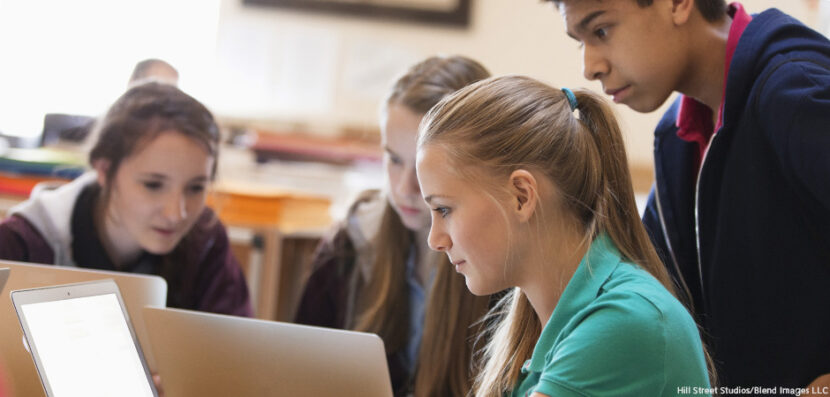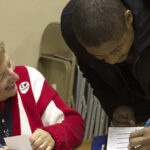
Photo Credit: Hill Street Studios/Blend Images LLC
Students in today's classroom can use the Internet to voice their opinions anywhere. Classroom Connection gives you the chance to speak out on political issues.
Classroom Connection: Judging Political Engagement
Election Central’s Classroom Connection feature allows students from across the country to send in their views on political issues, using the site’s online submission forms.
Recently, a group of students from De Soto Junior High School in De Soto, Missouri submitted a batch of forms providing data on their level of engagement in the nations’ politics.
The following article is based on the online responses provided by the De Soto students. Thank you very much for offering your point of view about political issues!
An Introduction
The responses give here reflect information using the Political Engagement Online Submission Form, which can be seen here. These questions were created to gauge how much attention and involvement students had in the news media, political debates, and how much time and thought they put into political topics.
Open and close the interactive blades below to see a summary of the responses sent in by the De Soto Junior High students.
How much attention do you pay to politics?
According to these students, they haven’t been paying that much attention to politics so far. At most, one student pays attention “half of the time” but admits that they don’t listen too carefully.
Another student responded that when they are paying attention, it tends to be a focus on which candidate is in the lead at that time.
Are you more interested in national or local politics?
An overwhelming percentage of the students that responded to this question said that they pay more attention to national politics and the news stories out of Washington D.C. than they do state or local issues.
And this matches with similar trends that are broadly viewed across the country. Certainly, there is MUCH discussion of national politics every four years when a new president is being chosen. But we must all remember that simultaneous to that, a great deal of state and local races are also being decided.
Check with your local new media to find out more about the topics that affect your daily life where you live and get educated on the political positions of the people running for local offices.
Are you a conservative, liberal, or independent?
The majority of the students who responded to this say that they are independent. One student was definitely in the liberal camp. A few others were not sure where they belonged, so maybe they are open to being persuaded.
What would you change about how politics operates?
Only two students agreed on what they would change about how politics operates in the United States. And, perhaps not surprisingly, they focused on taxes–a constant source of frustration for many Americans.
Another student said that they would change Obama Care–the Affordable Care Act health care reform that President Obama passed in his first term in office.
Another student said they wished that politicians would “quit fussing about gun laws.”
Another student said that they would like “no more bills,” but it was not clear whether they meant no more laws out of Congress or whether they meant no more tax costs.
Who is your favorite president?
Abraham Lincoln was the most commonly mentioned favorite president among the students at De Soto Junior High. The nations’s first president and military leader of the Revolutionary War, George Washington, also got a vote. Teddy Roosevelt also got a mention as one student’s favorite president, but another student said that they did not have a favorite White House resident.
What is your opinion of the U.S. Congress? Do you know your state representatives?
The students of De Soto didn’t have very strong opinions about the members of the U.S. Congress–either individually or as a collective group. They also didn’t show a high amount of recognition with their state representatives–which may not be that surprising considering that they said they paid more attention to national politics than they do local and state races.
One good bit of news is that several students could identify that the Missouri governor is (currently) Jay Nixon.
Where do you typically go to find political news?
It seems that the students get their news either from television media or from the internet. One student said that they watch the local Fox new channel when they are at home and are interested in catching up on news. Another student said that they ask their dad for his interpretation of what is happening in politics. Another said that when visiting their grandpa, they might watch the news together, but otherwise, they don’t seek out the news very much.
Other than the news, students go to the Internet to learn more about politics. No specific news Web sites were mentioned by name, but one student said that they checked out political discussions while surfing Facebook or sometimes while checking out Snapchat.
Related Links
Thanks so much to the students who took the time to submit their thoughts about politics on Election Central. Go Dragons!
David Martin



